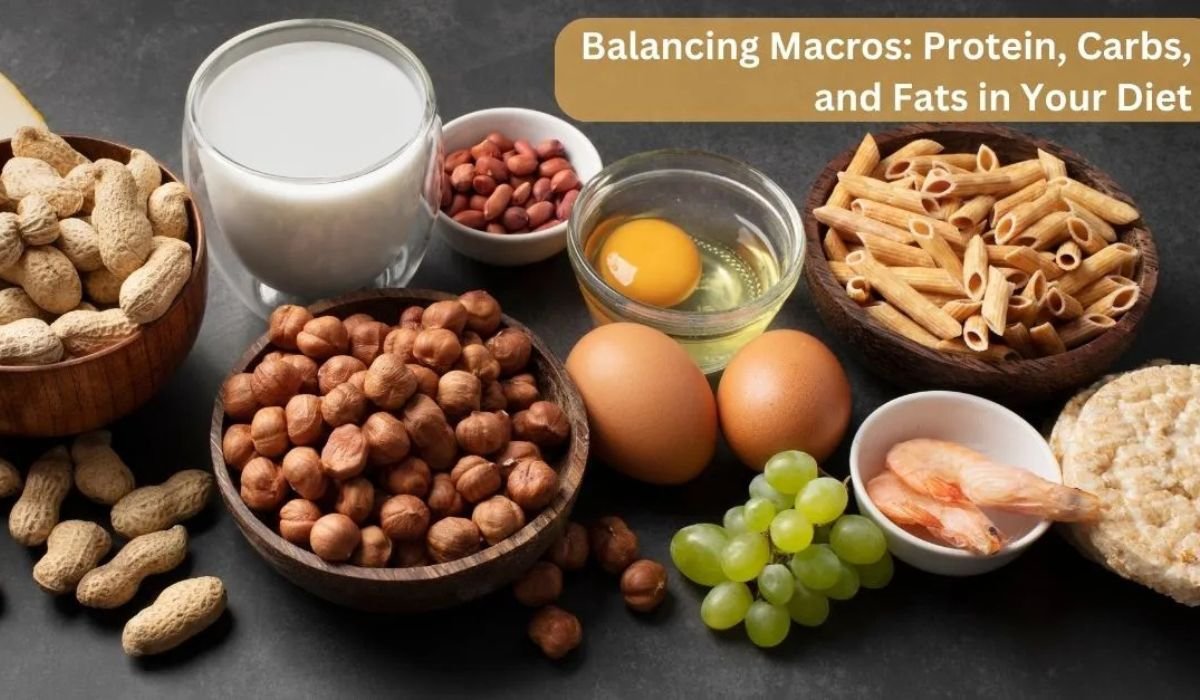To improve your health, managing macros – proteins, carbs and fats – is very important. The quality and nutritional value of dishes are emphasized, besides how much is eaten. A balanced intake of proteins, carbohydrates and fats may result in improved health, weight loss and stronger wellness. You will learn in this article about macros and how you can balance the amount of proteins, carbohydrates and fats you eat. If you are into fitness or simply wish to improve your health, these instructions will instruct you towards a better diet.
1. The Basic Points of Macros
The macros or macronutrients, that your body needs at high levels are proteins, carbohydrates and fats. They all play different and specific parts in your body. To build and repair tissues, use protein, to supply your body with energy take carbs and fats assist with cell growth and hormone production. Getting the right balances among these macronutrients is important for a proper diet. You need to know the role of both fats and carbs, not just reduce them. Having such a good balance helps your body stay healthy, gives you energy and works as it is supposed to.
2. Counting Macros: The Role of Macros
Carbohydrates, fats and proteins are where most food calories come from. All calories are not the same. What you eat for calories changes how they are handled by your body. Having 100 calories of protein is different for your body than having 100 calories of fat. Learning how many calories and healthy nutrients are in your macros supports good eating habits. Having this knowledge allows you to make your diet fit your body for better weight management and exercise plans.
3. How Protein Benefits Your Body
Protein is a main part of life, helping to form muscle, mend tissue and make enzymes and hormones. You need enough protein in your diet to prevent muscle loss, especially if you are regularly active. Lean meat, different types of dairy, beans and lentils are all good sources of protein. The amount of protein you need depends on your weight, how much you exercise and your health plans. Make sure each meal contains the right amount of protein so your body gets the nutrients it must have every day.
4. Carbohydrates Help Give You Energy
Your body uses carbohydrates to supply most of its energy. They end up as glucose which helps to fuel the work of your brain and muscles. Even so, there are differences among carbs. Examples of complex carbohydrates such as whole grains, vegetables and fruits, keep you going with energy and the nutrients you need. In comparison, simple carbs found in cookies, candy or fast food give instant energy yet have virtually no nutrients. Choosing more complex carbs means it will be easier to control your blood sugar and avoid snacking too frequently which helps with weight loss and health.
5. Fats are essential but they are often not understood well.
For a long time, people have mistakenly thought that fats were unhealthy. Fats are also necessary in the body because they help with getting nutrients, sending messages through nerves and preserving cells. Special attention should be given to healthy fats in avocados, nuts, seeds and fish. They aid in heart health by lowering the risk of inflammation. To reduce the risk of heart problems, you should eat less saturated and trans fats, usually in processed foods and increase your daily intake of unsaturated fats. Learning about different fats and their effect on health is very important for a proper diet.
6. Eating the Right Nutrients for Weight Loss
Eating less food doesn’t always result in weight loss; you really need to eat healthy foods. Getting your macros right can be very helpful as you work on fitness. For successful weight loss, add more protein to your diet for muscles, pick complex carbs for long-lasting energy and bring in healthy fats for you to feel full. The goal is to lower your calorie intake just enough so that your nutrition remains good. Diets that cut out too many foods are usually hard to stick with. A balanced focus on weight loss helps you become healthier as well as achieve your weight loss goals.
7. Preparing Balanced Meals
Using meal planning helps you follow a macronutrient-balanced diet. To do this, you should arrange your meals so that you have just the right amount of proteins, carbs and fats. Figure out what your main or long-term goals should be based on your personal preferences. Once you have your goals, design a meal plan that contains different healthy foods. When you follow a meal plan, you avoid going for unhealthy options at the last minute and get enough of each nutrient during the day.
8. How Water Affects Nutrient Balance
Drinking enough water is important for managing macros. Metabolizing food nutrients needs water. Enzymes aid in breaking down carbs and proteins and they also help transport fats in the body. Adequate water intake can curb hunger, sometimes people misinterpret thirst as hunger. Drinking enough water regularly will support the efficient use of the macros in your diets.
9. Make Requirements Practical
Macronutrient requirements are affected by the amount of exercise you do. Higher activity levels might require you to eat more carbohydrates to provide energy. If you are into strength training, your body needs extra protein to help repair and create muscle. Make sure you alter your macro intake according to your exercise so your body gets enough food for your daily routine and helps you recover afterward.
10. Keeping an Eye on What Nutrients You Are Consuming
Keeping track of your carb, fat and protein intake matters, mainly when you begin or want to focus on a particular health issue. Track your meals with an application or diary to know if you are at your goal weight. Allow yourself to change your macronutrient breakdown as needed. Because of age, your physical activity and other things in your life, your body might not need the same nutrients as before. Checking your weight and nutrition regularly allows you to stick to your health objectives.
Summary: Choosing a Moderate Approach to Food
Balancing macros refers to building a diet that helps fulfill your health, lifestyle and wellness goals. Different approaches may work for different people, based on how your body uses different nutrients. If you balance your portion of proteins, carbohydrates and fats, your body can enjoy fuel, stay strong during your activities and stay healthy. The aim is to pick eating habits that are healthy and satisfying for you in the long run. Following this way of eating allows you to choose different foods, take good care of yourself and adopt better habits.



